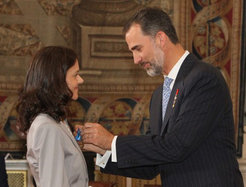Dr. Mari Carmen Bañuls receives Royal Spanish “Orden del Mérito Civil"
Dr. Mari Carmen Bañuls, a scientist in the Theory Division of Prof. Ignacio Cirac at the Max Planck Institute of Quantum Optics (Garching), has been excelled with the Order of Civil Merit of the Spanish Crown.
In a ceremonial act on 19th of June 2015, the day of the first anniversary of the proclamation of King Juan Felipe of Spain, the King and Queen Letizia donated the Order of Civil Merit to 38 Spanish citizens. The “Orden del Mérito Civil” was established by King Alfonso XIII of Spain in 1926. It is presented to people who have served the State to the benefit of the Spanish Nation. In his speech King Juan Felipe emphasized the importance of individuals who – by their extraordinary contributions in social, cultural and scientific areas – make Spain a strong and outstanding nation.

King Juan Felipe of Spain donates the Royal Spanish Order of Civil Merit to Dr. Mari Carmen Bañuls.
Mari Carmen Bañuls, born in 1973, studied physics at the University of Valencia. In 2000 she completed her PhD in particle physics in the group of Prof. José Bernabéu. Then she moved to the Universidad Politécnica of Valencia, where she had a research and development position at the Technological Institute for Computer Science (ITI) and worked on distributed systems. At the same time she enrolled in the PhD program at the university in the group of Prof. Pablo Galdámez, and in 2006 she received her second PhD in computer science.
In 2005, Dr. Bañuls became a postdoc in the Theory Division of Prof. Cirac at MPQ where she has been a Research Associate for the past two years. In her research she mainly works on algorithms which are based on quantum information ideas and quantum information theory. They are used to simulate the dynamics of quantum many-body systems and to get a better understanding of them. “I am working on the development of these algorithms and their application to different problems. This of course also involves computer science, because it is numerical simulation that we use most of the time”, the young scientist explains. “These techniques are very good to simulate the kind of setups they have in the optical lattice experiments.”
Dr. Mari Carmen Bañuls has already received quite a few scientific awards, among those for example the Annual Extraordinary Degree Award in Theoretical Physics of the University of Valencia in 1996, or the Award to Academic Profit, Consellería de Cultura, Educación y Ciencia (Generalitat Valenciana) in 1997. Olivia Meyer-Streng
